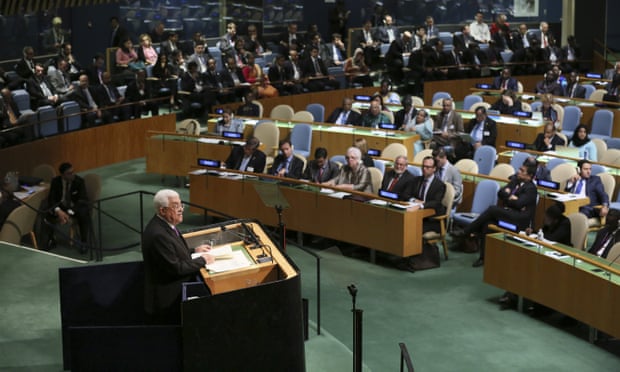
Mahmoud Abbas, has said Palestinians would “no longer continue to be bound” by the 20-year-old Oslo peace agreements, unless they receive “international protection” from Israel
Speaking at the United Nations general assembly in New York, the Palestinian president said the agreements remained one sided and needed updating. .
Watched by a stony-faced Israeli UN delegation, led by its ambassador to the UN, Ron Prosor, Abbas called for the international community to recognise Palestine as a “state under occupation”, in the same way countries were occupied in the second world war.
Abbas also accused Israel of risking turning a “political conflict” into a religious one over the fraught issue of the al-Aqsa mosque – the focus of recent clashes.
Although Abbas went further than many had anticipated it remained unclear whether his threats over the Oslo accords, which Palestinians argue Israel has comprehensively breached, should be taken as a warning or an indication of more imminent moves.
Abbas said: “We cannot continue to be bound by these signed agreements with Israel, and Israel must assume fully its responsibilities of an occupying power, because the status quo cannot continue.
“We will start the implementation of this declaration by all peaceful and legal means. Either the Palestinian National Authority will be the conduit of the Palestinian people from occupation to independence, or Israel, the occupying power, must bear all of its responsibilities.”
In September, Abbas warned he intended to deliver a bombshell in his UN speech – delivered a day ahead of Israeli prime minister, Binyamin Netanyahu’s. Ahead of his speech Abbas’s aides had circulated to diplomats a document comparing the Oslo accords against claimed Israeli violations.
Significantly however, Abbas did not announce the dissolution of the Palestinian Authority or the cancelling of security co-operation with Israel as some had speculated he would.
Abbas had gone to New York hoping to secure commitments from US secretary of state, John Kerry, that Washington would breathe life into the moribund peace process – guarantees he failed to secure from a US administration distracted elsewhere in the region.
It was Abbas’s most serious warning yet to that he might walk away from engagement with Israel and dissolve the Palestinian Authority, although he stopped short of accompanying his threat with a deadline.
On Wednesday, he said that Israel’s refusal to commit to agreements signed “render us an authority without real powers”.
He said: “As long as Israel refuses to cease settlement activities and to the release of the fourth group of Palestinian prisoners in accordance with our agreements, they leave us no choice but to insist that we will not remain the only ones committed to the implementation of these agreements, while Israel continuously violates them.”
Abbas’s tough talk could be an attempt to mask his political weakness. Hopes of setting up a Palestinian state have been derailed, and there are calls for the leader to resign and dissolve the PA. Without a specific deadline for taking those steps, Abbas left himself room for diplomatic manoeuvres to refocus the attention of the international community on the Israeli-Palestinian conflict.
He accused Israel of “repeated, systematic incursions upon al-Aqsa mosque, aimed at imposing a new reality,” warning that such actions create an explosive situation.
“It is no longer useful to waste time in negotiations for the sake of negotiations; what is required is to mobilise international efforts to oversee an end to the occupation in line with the resolutions of international legitimacy,” he said. “Until then, I call upon the United Nations to provide international protection for the Palestinian people in accordance with international humanitarian law.”
In a harshly worded essay ahead of his Wednesday address to the United Nations, Abbas said a new multilateral approach to the Israeli-Palestinian conflict is needed since direct negotiations with Israel have repeatedly failed.
Abbas said the model should be based instead on the type of negotiations that took place in the Balkans, Libya and Iran. Several rounds of talks, often with American mediation, have failed reach a peace accord and Abbas shunned renewing them.
There was no immediate comment from Israel.

No comments:
Post a Comment